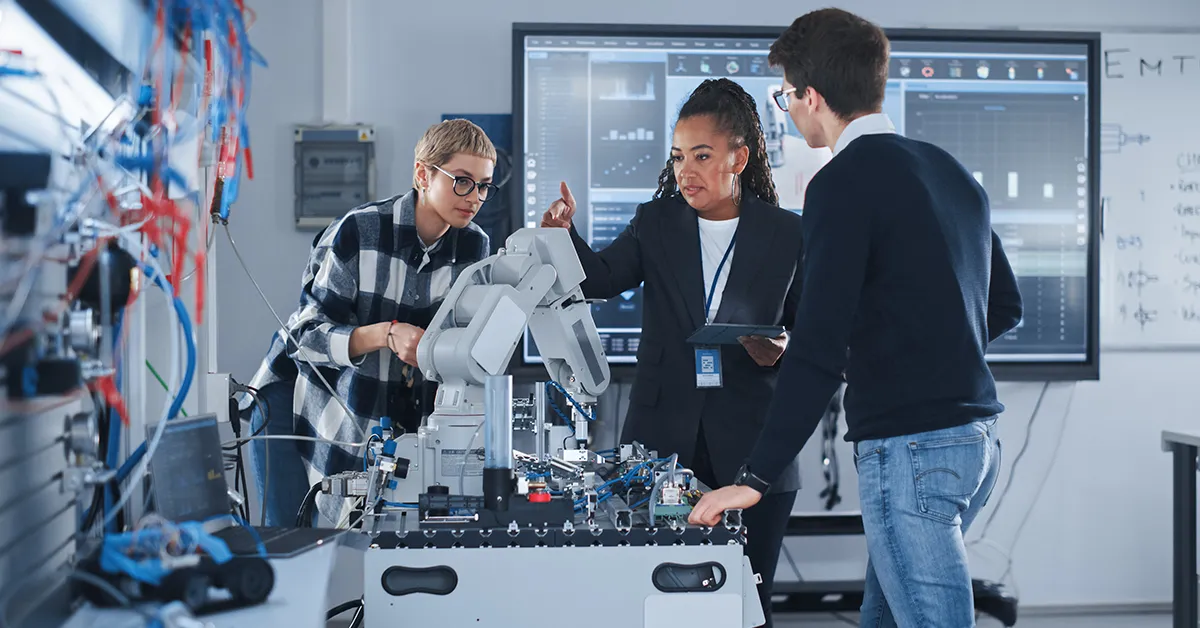Artificial intelligence (AI) provides groundbreaking solutions for people with disabilities, enhancing their ability to navigate online spaces and interact with the online and offline world. From enabling visually impaired users to “see” the internet to giving voice to those who communicate through sign language and offering robotic assistance at home to those with mobility challenges and cognitive disabilities, AI technology is changing and improving how we live, learn, compute, and connect. Find out how AI is helping with accessibility:
AI Provides Accessibility for Visual Impairments
Screen readers are software programs that allow visually impaired users to read the text displayed on computer screens via spoken feedback or braille display. In order to read pictures, screen readers have previously relied on developers and content creators to label images with alt text to make them accessible manually.
Unfortunately, billions of online images are unlabeled and inaccessible to visually impaired internet users.
Google is using AI as a solution to this challenge. Google’s ChromeVox screen reader uses AI technology to describe unlabeled images using a single machine-learning model to generate descriptions in sixteen supported languages.
Ai-powered screen readers can interpret and describe text and images on screen, making web content accessible to visually impaired users, but its benefits extend far beyond internet-based uses.
Ai-technology is also being incorporated into wearable devices to provide real-time object and face recognition that helps the visually impaired find objects and identify people IRL.
Microsoft’s Seeing AI is a free smartphone application designed for the blind and low-vision community, using AI to help with reading, object recognition and description, and product identification.
AI Provides Accessibility for Hearing and Speech Impairments
Hearing loss is the third most common chronic health condition in the United States—it’s twice as prevalent as diabetes or cancer. Rates of hearing loss are expected to double in the next four decades. Ai-technology can help the hearing impaired and those with hearing loss.
AI sign language interpretation is now making it possible for deaf people to speak with anyone, anywhere. Gloves equipped with sensors use AI Technology to detect and translate sign language IRL. This technology can help businesses, institutions, and governmental bodies offer sign language services to the deaf community more readily and affordably. Online, AI-assisted sign language technology can help deaf internet users communicate with every online community, hearing or not.
AI is also helping the hearing impaired with real-time captioning and transcription capabilities, enabling real-time captioning for video content and live events.
Advanced AI algorithms can also understand and synthesize speech, including speech that might be difficult for humans to understand due to impairments. AI-driven translation tools help break down language barriers, making information and communication accessible to non-native speakers or those with language impairments.
AI Provides Accessibility for Mobility Impairments
Robots make for good news headlines, and robotics researchers love showing off a robot that can tidy a room or a robot that can cook a three-course meal and, even better, clean up afterward.
These advances may leave many of us dreaming of a Jetsons-esque future with our very own Rosie the Robot helpers at home, but for those with mobility impairments, AI technology is opening the door —literally—to a more accessible world.
AI allows for robust voice command systems that enable individuals with mobility impairments to interact with technology and control various devices hands-free. In the home, AI-driven home automation systems help people with limited mobility control their environment, using voice or simple commands to operate lights, thermostats, and appliances. And AI-powered wheelchairs can take users' audio cues, providing more freedom and mobility options for people with disabilities.
AI Provides Accessibility for Cognitive Impairments
Dementia is currently one of the leading causes of disability and dependency for older adults worldwide. AI technology is being deployed to help with home care tasks for patients with dementia.
Assistive robots come in many forms, including:
- Socially assistive robots like humanoid Pepper, a robot programmed to engage people with dementia and those with severe brain injuries in cognitively stimulating activities.
- MARIO, a humanoid robot, provides nursing home residents with dementia access to personalized calendars, entertainment, news, photos, and opportunities to connect with friends and family.
- Telepresence robots are semi-autonomous videoconferencing monitors attached to mobile platforms that can be controlled remotely by a family member and move around the patient’s home environment to support social interactions between patients and their family members.
- Pet robots such as aibo, a robotic dog, JustoCat, a robotic cat, and PARO, a robotic seal, have been found to elicit positive responses from dementia patients, including reduced agitation and improved mode and social interactions.
AI systems online can adapt and personalize learning experiences for individuals with cognitive impairments, making education more accessible and effective, while AI-powered tools can assist individuals with memory impairments by providing reminders, instructions, and assistance in decision-making processes.
AI Tech Improving Mental Health, Health Care, and Emergency Services
AI technology is being deployed to provide mental health support in the form of AI-driven chatbots offering an immediate, consistent, and judgment-free zone for individuals to seek help. For emergency services, AI is being used to enhance emergency response, prioritize dispatch, provide emergency chatbots, predict wildfires and other natural disasters, and analyze images and videos of emergency scenes to provide insights to first responders. In healthcare, AI technology is helping with diagnosis, like this AI model that can detect skin cancer with 100% accuracy.
AI technology is making the world more accessible for people with impairments and disabilities, both online and off. From improving the quality of internet use to improving social connections between communities, AI technology is improving the lives of people around the globe.

